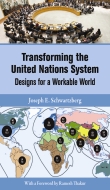I just finished H. Peter Langille's Developing a United Nations Emergency Peace Service this morning

and have begun Joseph Schwartzberg's Transforming the United Nations System: Designs for a Workable World.

For the two national conventions the focus was solely on our exceptionalism. If other nations and their people even exist it must be as terrorists or economic competitors. There was no mention of the United Nations or any global effort to address the challenges facing us as a human family on a finite planet. There is Trump's personal exceptionalism belief, and Clinton's American exceptionalism dogma. My realization aligns well with the third new book on my reading table, Charles Derber and Yale Magrass' Bully Nation: How the American Establishment Creates a Bullying Society.
I find it astounding that there is almost no discussion of the need for global responses to the challenges that face us. That there really is, if you read the paper or watch the politicians, only the U.S. to save the world. If you are Donald Trump supporter, you likely add him to the savior list. That we might even conceive of building a global democracy seems inconceivable if you listened to any of the speeches at either convention. Yet, without the albeit imperfect United Nations more of the global fabric would be torn and tattered than we find it today. We need to strengthen it not ignore it.
We profoundly constrain our ability to imagine alternative, brighter futures if we insist that every single proposal be weighed down by the heavy ball and chain of "PPP" -- present political possibility. Nothing will ever become politically realistic unless someone first declares it to be politically desirable -- and proclaims it, however distantly, as an eventual historical goal. If politics, as every freshman knows, is the art of the possible, then political change ought to be about expanding the boundaries of future possibility. (Tad Daley, as cited in Langille p.94)
Langille has tackled the boundaries of future possibility of a global peace service with this important work. He has studied and built on all the efforts that have brought us thus far in an efforts by the human family to govern ourselves. His proposals seem sound and surely the need has never been greater.
The International Coalition for the Responsibility to Protect notes in a stunning infographic of the 60,000,000 displaced persons for the huge need for security and shelter. 42,500 persons are displace EVERY DAY. That somehow we might think we can continue to ignore this issue without blowback seems foolish. Ignoring this accelerating nightmare won't have it go away. Bless the many civil society roups and the UN High Commissioner for Refugees for doing what they can with limited resources.
I find some solace that there are networks of people around the globe who are working to make the concept of a global democracy a human security a political possibility, knowing with much evidence that it may not occur in their lifetimes. But it is through the aspirations voiced by the global community through the auspices of the United Nations system that lead us towards a better world.
Last fall's global agreement on the Sustainable Development Goals (SDG's) is perhaps just the latest version. Agreeing to those 17 goals with aspirations to achieve them by 2030 is a significant step. It surely doesn't mean we will get there, but if we can collectively agree to aim there, our chances improve. Such is the spirit that spurs Langille to tackle reasonable approaches to creating global standing and standby forces that can be sent quickly into emergency situations, whether they involve conflict, disasters, or any emergency need where we have a responsibility to protect the vulnerable. Goal number 16 is PEACE. Langille helps us move towards it.
One additional possible positive consequence of developing such a peace service could be less need for individual nations to spend so much on their own separate military forces, thus allowing funds to be used for human development and environmental protection.
While I'm not far enough into to Schwartzberg's book to give any kind of synopsis, I can speak to the insights that professors Derber and Magrass are making in Bully Nation. While they applaud the rising interest in dealing with schoolyard bullies through counseling and for both the bully and the bullied, they believe that the emphasis on bullying as a psychological issue misses the larger social systems that conspire to nurture a bullying culture. I am not far enough into it to relay their arguments sufficiently, but already I sense some solid truth in their analysis.
With Donald Trump playing the bully role to the max these days, perhaps he will help us awaken to our own nation's bullying efforts which we seem to believe are appropriate because we are exceptional. We need to come to the realization that we're all in this together soon. These three books help us see the way forward to fulfilling that idea. Read on....
